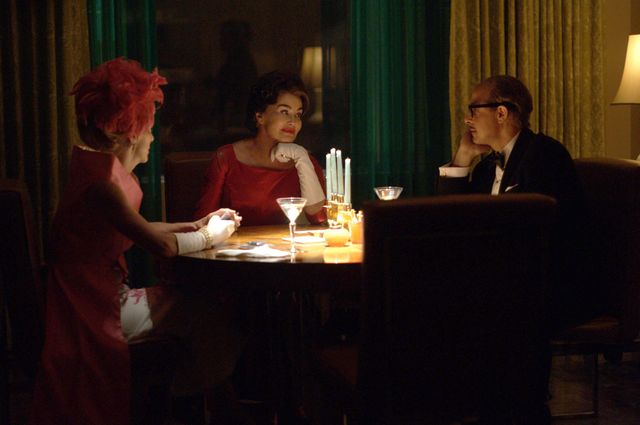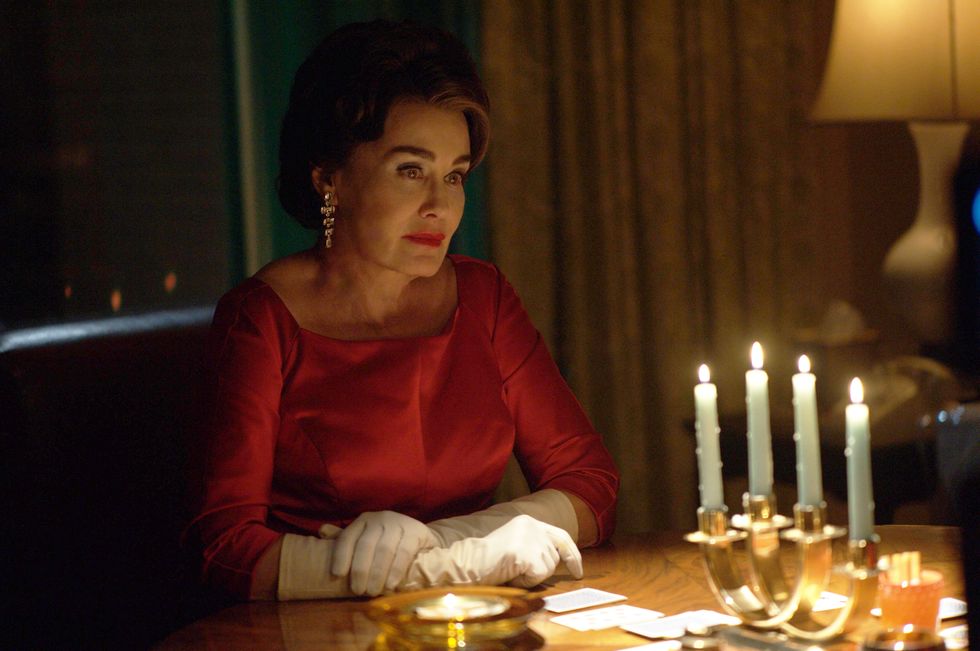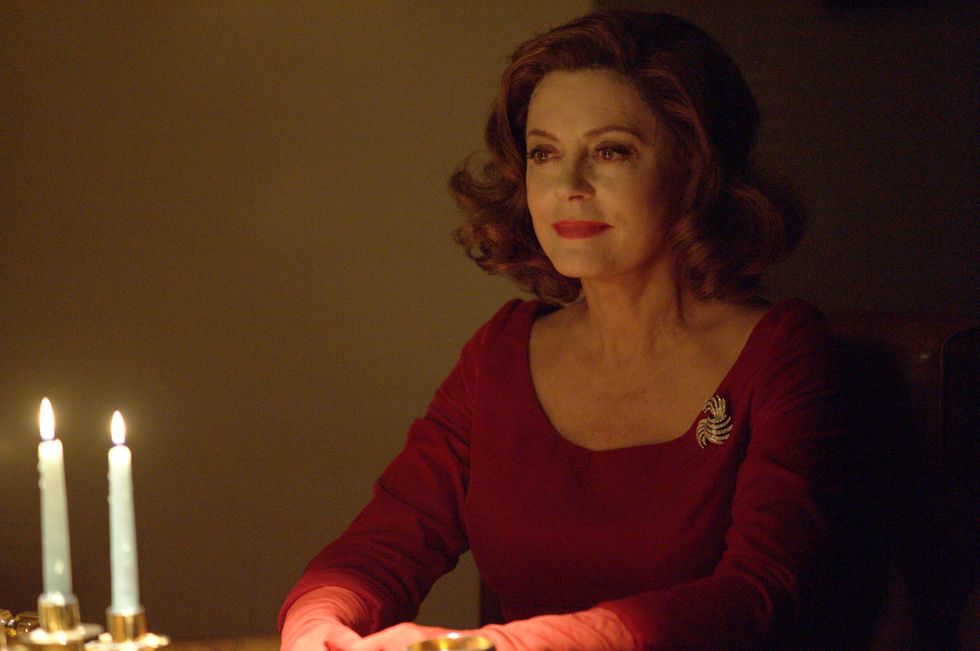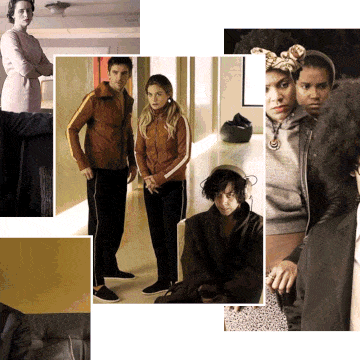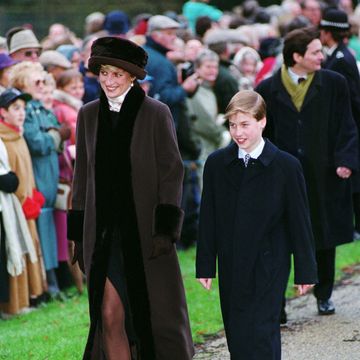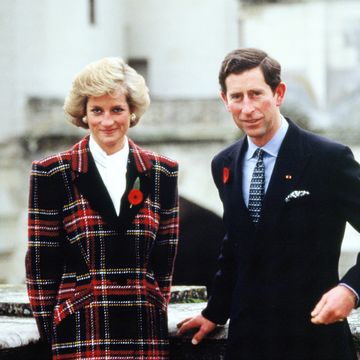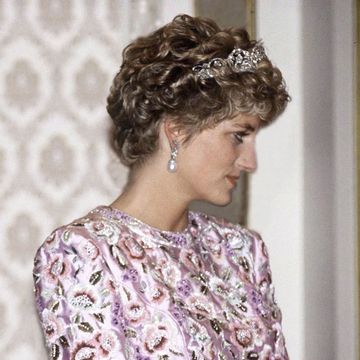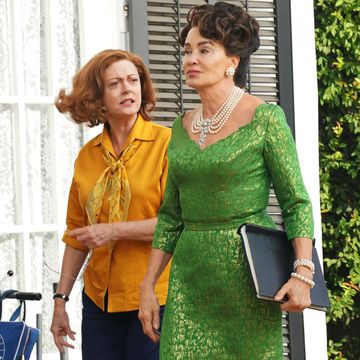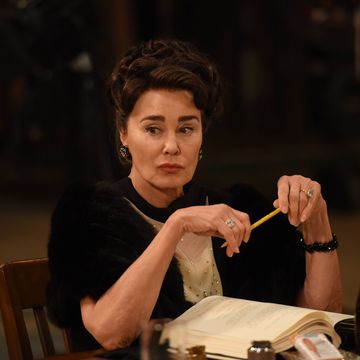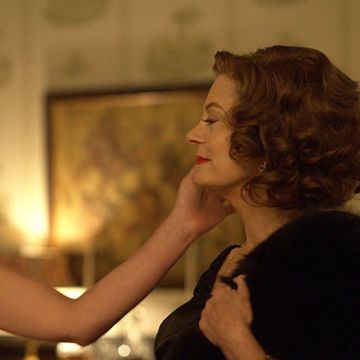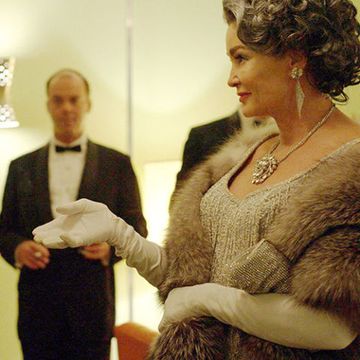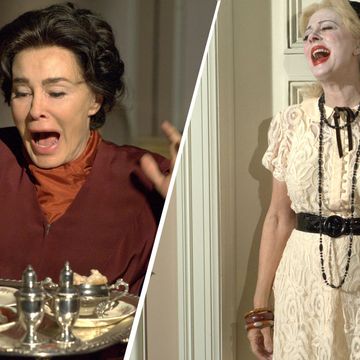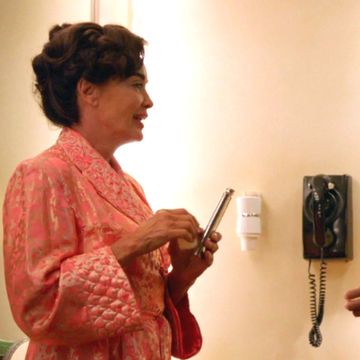Inconceivable though it was that Feud: Bette and Joan would end with any kind of reconciliation between its warring leads, I couldn't help but be hopeful. Real life does not play out in neat narrative arcs, and as such there's no evidence to suggest that the real Bette Davis and Joan Crawford ever came close to burying the hatchet, or to acknowledging—as the show has done frequently—that under different circumstances they could have been friends. But as the title of tonight's season finale makes clear, Ryan Murphy's interest all along has been in that thwarted friendship, and he delivered the payoff I was craving via a haunting dream sequence that could have been hokey if it weren't so meticulously controlled.
"You Mean All This Time We Could Have Been Friends?" takes its title from the final scene of What Ever Happened to Baby Jane?, in which Davis's Jane learns that her lifelong resentment of her sister Blanche (Crawford) is built on a lie. There's no sudden revelation for Bette and Joan, so much as a gradual sense that as their lives have grown crueler and darker, they are still thinking of each other, and at times maybe longing for each other.
The finale covers a huge span of time, beginning in 1970—six years after last week's episode—and ending somewhere around the 1978 Oscars, shortly after Joan's death. Joan and Bette's increasingly bleak final years play out with commentary from Pauline (Alison Wright) and Victor (Dominic Burgess), both of whom are new participants in the documentary which gave Feud its structure. Pauline, who since leaving Aldrich has carved out a career in documentaries, describes reuniting with a drunk, emotional Joan in an airport, where she "seemed very much tossed away."
And that's how we find Joan, now living alone in a Manhattan apartment, her health ailing from years of alcohol abuse. After one last bid to hustle her way back into Hollywood with the horror B movie Trog and an unsuccessful attempt to launch a lifestyle brand, Joan officially calls it. She's done trying.
Years down the line, when Joan's health has declined even further and Mamacita has returned to take care of her, Joan awakes in the middle of the night. As The Flamingos' romantic-yet-eerie "I Only Have Eyes For You" plays, she wanders through the apartment to find Hedda Hopper and Jack Warner sitting at her kitchen table, laughing over war stories.
Their presence inspires a rare moment of introspection from Joan, as she confesses "I don't know who I am when I'm by myself." She's spent decades being permanently "on," terrified that someone would catch a glimpse of the girl beneath the movie star, "and I'd go back to that sad little wretch I'd been." The reason she clung so hard to her looks, her acclaim, her status, was because she never learned how to be anybody other than Joan Crawford, a name invented for her by MGM. Joan Crawford very literally does not exist, independent of Hollywood, and so the decline of her career was a blow she could never recover from.
It's at this point that Bette shows up in the unexpected role of Joan's advocate, suggesting that Jack and Hedda apologize for their part in making her life so miserable. They do say sorry, Warner in characteristically insincere fashion, but it's beside the point. Bette going to bat for Joan is the point.
"Why am I so happy to see you?" Joan asks warmly, after Jack and Hedda leave them alone, and Bette suggests "Nostalgia." They bond over The Young and the Restless—neither one of them gets out much—and Bette suggests that they play a card game based around regrets. Joan is sorry that she wasn't more generous with Bette; Bette wishes that she had been a friend to Joan; they're both tangibly relieved to finally be saying these things to each other.
"It's not too late," Joan says, confessing with girlish glee that she's often fantasized about staying up late with Bette, bonding over the men and the movies and the industry they've both known. Bette looks back at her, smiling but sad, as reality begins to tighten its grip and Joan's dream fades. Because it is too late, and they can't start over, and less than a week later Joan will be dead.
Joan gradually being roused from her sleepwalking dream by Mamacita, and looking around in confusion at her dark, empty kitchen, is the most brutal moment in a generally brutal episode. But her vision—which turns out to be effectively her dying dream—is made more powerful by the Bette moments that bookend it. Urged on by Victor, Bette reaches out to Joan, but can't bring herself to speak when Joan answers the phone.
Without that scene, it would be easy to assume that Joan's desire to reconnect is one-sided, that the warmth of her dream is merely her fantasy. But it's mutual. When Bette hears from a reporter that Joan has died, she responds with her most infamously cruel line: "You should never say bad things about the dead, only good… Joan Crawford is dead. Good." But as played in the moment, it's clear that Bette is shellshocked, and defaulting to her standard M.O. of cocky one-liners to hide real pain.
The question underlying the finale, given Pauline and Victor's participation, is whether Bette will agree to be interviewed for the documentary. And at the 1978 Oscars, she finally declines, telling the director she has no interest in giving him bitchy one-liners about Joan. "She was a professional," she says, having come to appreciate Joan's work ethic. "We did one picture together. Our lives intersected. That's it." It would have been unrealistic in the extreme to have Bette and Joan share one last cathartic conversation in real life, but that near-miss phone call and the dream sequence that followed gave their toxic relationship real closure nonetheless.
Feud: Bette and Joan was as much about a missed opportunity for friendship as it was about a rivalry, and while I didn't always love the beats of the feud itself, I found that story—about these two women who could have made each other's lives better—incredibly affecting. Life is short and it's always later than you think. Be generous. Be vulnerable. Say the thing you're afraid to say to someone.

Emma Dibdin is a freelance writer based in Los Angeles who writes about culture, mental health, and true crime. She loves owls, hates cilantro, and can find the queer subtext in literally anything.
